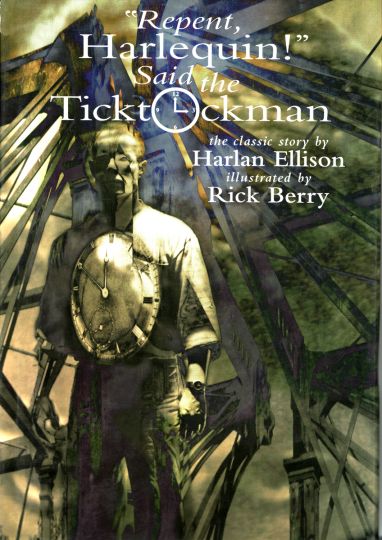Kris
Repent Harlequin is another one of those stories that I have read more times than I can count, largely because it is so ubiquitously reprinted (looking at ISFDB they list over 100 instances from 1965 to 2020 with no gap of more than a few years). But, unlike “The Star”, this is one I rather enjoy.
First off it is an excellent little tale of a Joker like character taking down a time obsessed society through lateness and absurdity. There is something both fascinating and rather fun about that.
Then, we have Ellison’s clever and breezy style which almost has a tick tock motion to it, driving the story along and also making us feel the themes through the writing.
Then of course there is the way he plays with narrative throughout the piece, making a story about fighting an ordered society disordered as we have to read it in fractured parts.
Not sure if it is Ellison’s best but it is certainly a great piece.
Kit
I admit I spent a bit of the beginning thinking this was a race of androids that had done away with the humans somehow. Once I worked out what was going, this one feels like the most currently relevant of any of the things we’ve read so far. At its core, this is just-in-time supply lines applied to every part of a society and carried out to the most extreme form possible; their society feels distressingly not that different from modern retail or factory work in that regard. (And I appreciate that “Where did he get that many jelly beans?” is at least acknowledged even if it is waved away. The narrator knows how absurd this is, therefore it’s fine.) The bosses are in their place, the brainwashing and torturing of the prisoners… this is as relevant now as it was when it was written, and it’s well-written both in terms of imaginativeness and the sentence-level prose. Maybe it’s always relevant; maybe this societal obsession is timeless. This is the best one we’ve read so far this year, and it truly deserves its Hugo.
Gavin
The one thing that strikes me in this story is the creation of the Harlequin, of a man who can’t keep up with society, who’s constantly late. His society keeps treating him like his constant lateness is a personal failing or a delinquency. I think, if he was capable of being on time, he would’ve caught up with society ages ago. Feels like the Harlequin might be a bit neurodivergent.
So, he strikes back at the society that wouldn’t accept him for who he was, and demanded he be like everyone else. Confronts them in order to get them to break out of the constraints society has forced upon them, to ignore the clock and take the time to LIVE.
Conformity has always rubbed me the wrong way, probably because any attempt on my part to conform would be an act, and a laborious one at that. I can’t be like everyone else because I’m NOT like everyone else. I’m different. That’s okay, and society should be widened so it’s capable of accepting the different. Else, we’ll have a society that is only livable for those who can conform. In this story, that’s quite literal.
It’s clear this is a society gone rotten. I wonder if Harlan Ellison relates to the Harlequin, or has a problem with overly conformity driven societies. Possibly so. Humans aren’t machines, we don’t run on clocks, we run on our own subjective sense of time. He’s seen what a society obsessed with the clock looks like, and doesn’t want to live there. I gotta say, I probably wouldn’t want to live there either, and might find my cardioplate switched off before long.



